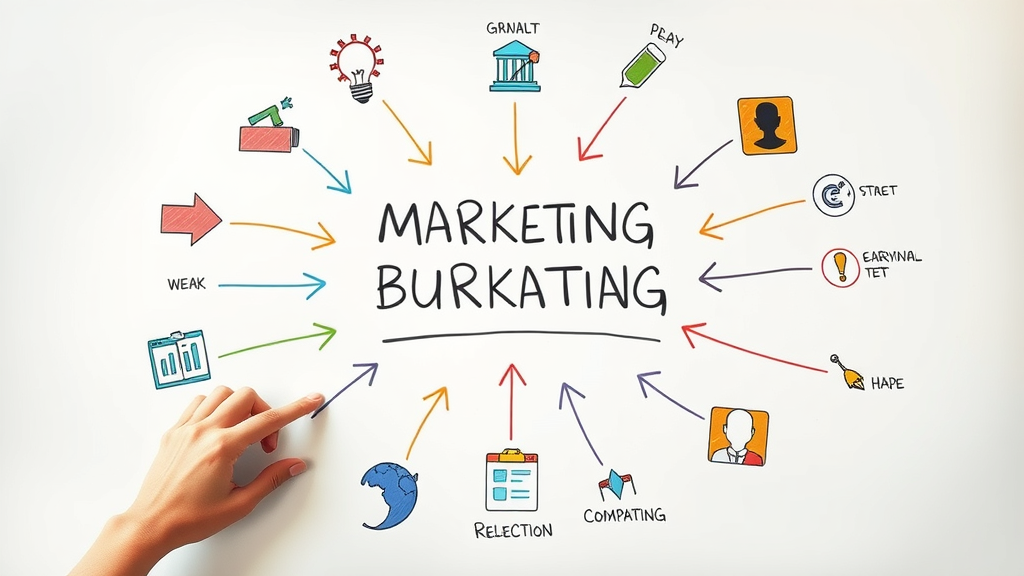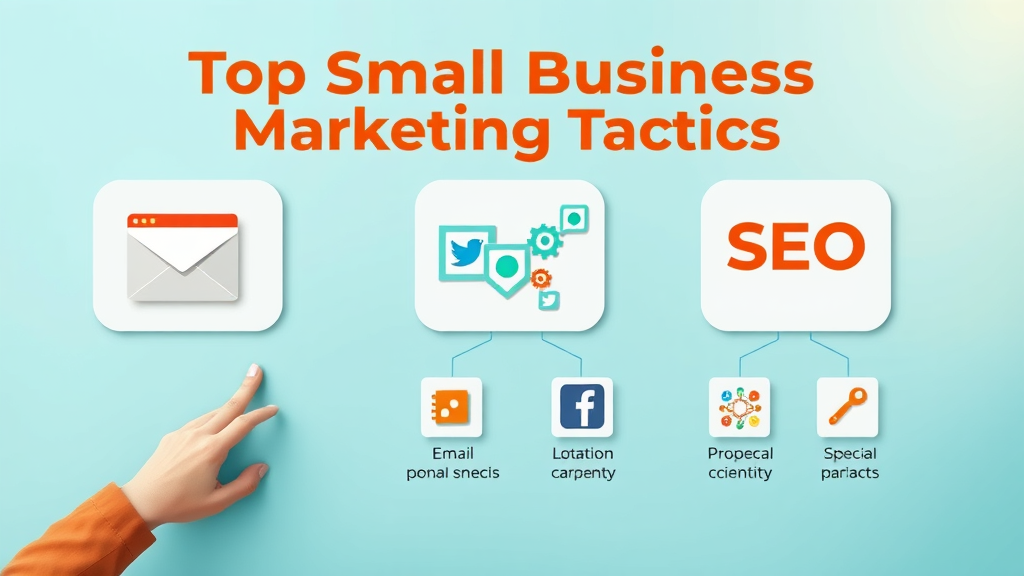Did you know that 47% of small businesses invest less than $10,000 per year in digital marketing — but those who do often outperform their peers? In today’s fast-paced world, it’s not enough to offer great products or services. You must master small business marketing to make sure your voice gets heard. This comprehensive guide dives deep into how you can use cutting-edge strategies and smart tools to boost your growth, attract more potential customers, and dominate your business market — even on a shoestring budget. Let’s build success together!
Why Small Business Marketing is the Game Changer for Growth
- Did you know that 47% of small businesses invest less than $10,000 per year in digital marketing—but those who do often outperform their peers? Discover why effective small business marketing is crucial right now.

"Effective marketing is not an expense but an investment in your small business’s future." — Marketing Industry Expert
Small business marketing can be the difference between slow growth and standing out in a noisy marketplace. Unlike larger corporations, small businesses operate with tighter budgets, but they also benefit from agility and the ability to build authentic relationships quickly. When you invest in smart, strategic business marketing, you position your company to not only survive but thrive—even if your budget is smaller than the competition’s.
Whether you run a local boutique or an online store, leveraging digital marketing lets you reach your target audience directly, track results in real time, and pivot quickly as trends shift in the business market. This increased adaptability means you can capture opportunities and respond to your potential customers’ needs faster than any big brand. Effective small business marketing allows you to build a loyal customer base and achieve long-term growth, regardless of industry fluctuations.
Unlocking the Fundamentals of Small Business Marketing
What is Small Business Marketing and Why Does it Matter?
- Definition of small business marketing; Differences between small business and business marketing at a corporate scale; Addressing unique challenges in the business market for small businesses

Small business marketing refers to all the activities a business owner takes to promote their products or services to the right potential customers. Unlike large corporations that rely heavily on massive budgets and agencies, the marketing efforts of small businesses are often driven by the business owner or a tight-knit team. The primary distinction is that small business marketing needs to be more targeted and resourceful, eliminating waste and doubling down on proven tactics.
The business market for small businesses comes with unique challenges, such as limited budgets, less name recognition, and fewer marketing resources. On the bright side, small companies have the freedom to move swiftly and tailor every marketing plan to their customer base’s real-time feedback. They can experiment with digital marketing strategies, optimize their landing page, and build tighter relationships faster than their corporate competitors.
In a crowded business market, understanding the fundamentals of business marketing is essential. By focusing on what sets your business apart and addressing your customers’ unique needs, your small business can create a loyal customer base that keeps coming back, helping your brand grow consistently.
Identifying Your Target Audience and Target Market
- How to pinpoint your target audience; Understanding your target market dynamics; Real-world examples of defining potential customers
"If you market to everyone, you market to no one." — Small Business Guru
Knowing your target audience and target market is the backbone of any effective business marketing strategy. Start by asking: Who is most likely to buy your product or service? Segment your customer base by demographics such as age, location, interests, challenges, and even digital habits. This is crucial in tailoring marketing efforts that resonate with those most likely to convert.
Conducting thorough market research allows you to understand market needs and competitors, refine your message, and deliver content that stands out in search results. A bakery in a college town might target busy students by promoting late-night snacks on social media, while a landscaping company could target new homeowners in specific zip codes. Focusing your efforts not only maximizes your marketing budget but also increases ROI by reaching those most interested in your offerings.
Finally, keep iterating. Use analytics tools to monitor which segments of your customer base engage the most, and continuously refine your target audience decisions for the best results in today’s business market.
| Aspect | B2B (Business-to-Business) | B2C (Business-to-Consumer) |
|---|---|---|
| Main Focus | Relationship Building, Educating Decision-Makers | Brand Awareness, Emotional Connection |
| Typical Channels | Email Marketing, LinkedIn, Networking Events | Social Media, Paid Ads, Influencer Marketing |
| Buyer’s Journey Length | Longer (Several Weeks/Months) | Shorter (Minutes to Days) |
| Content Types | Whitepapers, Webinars, Case Studies | Video, Blog Posts, Promotions |
Building a Smart Marketing Strategy and Plan for Small Businesses
Crafting a Results-Focused Small Business Marketing Strategy
- Setting business marketing objectives; Budget considerations for small businesses; Selecting the right marketing tools

Creating a strong marketing strategy starts with clear objectives. Are you aiming to boost website traffic, build your customer base, or launch a new product or service? Set measurable goals, such as increasing monthly sales by 20% or adding 500 new email subscribers. Every decision, from crafting landing pages to launching a paid ad, should align with these goals for optimized results.
Small businesses need to make every dollar count. Calculate a marketing budget based on your business goals, and prioritize low-cost, high-return marketing tools like email marketing platforms and social media scheduling apps. Check if automation tools can streamline tasks and free up time for big-picture strategy.
Lastly, make sure your chosen business marketing channels—like content marketing, paid ads, or direct mail marketing—fit both your objectives and resources. This approach ensures you maximize ROI while staying flexible enough to adapt quickly to market shifts.
How to Craft a Marketing Plan That Works
- Step-by-step guide for a small business marketing plan; Integrating market research into your strategy; Timeline and ROI tracking tips
"A goal without a plan is just a wish—especially in small business marketing."
An effective marketing plan is your business’s roadmap to growth. Start by reviewing your market research: What strengths set your business apart? Where is the business market trending? Once you’ve identified opportunities, outline target audience profiles and assign responsibilities to your team, even if that’s just you and a co-founder.
Next, layer in a detailed schedule for each marketing effort, defining when you’ll post on social media, launch an email campaign, or update your landing page. Set key performance indicators (KPIs) such as lead volume, open rates, or engagement metrics to measure what matters most.
Most importantly, track ROI for each tactic using tools like Google Analytics or built-in marketing tools in your email or social scheduler. Review performance every month and tweak your strategy for continuous improvement. Remember, your marketing plan should be dynamic—adapt as you learn what resonates with potential customers.
Must-Know Small Business Marketing Channels for 2024

With new trends emerging constantly, understanding the most effective digital marketing channels is essential for small businesses who want to outperform their competition. Harness these channels to ensure your products or services reach potential customers at every touchpoint—whether they’re scrolling social media or searching for your business on Google.
The most successful business owners stay open to using several channels in harmony, from website optimization and paid search engine marketing to eye-catching social media campaigns. In 2024, integrating your marketing efforts across digital platforms and traditional methods like mail marketing will help you engage every segment of your customer base.
Digital Marketing Channels Every Small Business Should Leverage
- Website Optimization: Your website is often the first impression potential customers have of your business. Make sure it loads quickly, looks great on mobile, and clearly conveys your products or services. Effective landing pages drive conversions and maximize the impact of every marketing effort.
- Search Engine Marketing Basics: Use platforms like Google Ads for targeted paid ads that reach customers actively searching for relevant offerings. Regularly fine-tune your website and landing pages to improve visibility in search results and outperform competitors in the business market.
- Mobile Marketing Trends: With most searches now done on mobile, focus on responsive design and tactics like SMS offers, mobile-friendly email campaigns, and mobile ads for immediate impact in your target market.
Layer these strategies with regular market research to keep your approach current. The key is to continually optimize your marketing channels to deliver the greatest possible return on investment for your small business.
Social Media Marketing: Driving Results for Small Businesses
- Choosing social media; Content creation & schedule; Social media advertising (paid ad)
Social media marketing offers one of the most cost-effective vehicles for brand growth. The secret is to pick the social networks your target audience uses most—Instagram and Facebook for B2C brands, or LinkedIn for B2B connections. Posting valuable, original content regularly—like quick tips, behind-the-scenes videos, or customer spotlights—keeps your brand top-of-mind.
Set up a content calendar to be consistent. Don’t just post and forget—engage directly with comments, shares, and direct messages. For bigger impact, invest in occasional paid ads to boost your best social posts and reach both followers and new potential customers.
Measure growth with platform analytics, and note which types of posts drive the highest engagement. This data will help you focus your business marketing where it counts most.
Unlocking the Power of Email Marketing and Mail Campaigns
- Building your email list; Email campaign tactics for potential customer engagement; Personalization and automation best practices
"Email marketing yields an average ROI of $42 for every $1 spent—an essential tool for small business marketing."
- Case Study: Small business that grew revenue 200% through email marketing
"Social media isn’t about being everywhere; it’s about being where your target market is most active."
Email marketing remains unmatched for return on investment and direct connection with your audience. Start building your list from your website, point-of-sale, and events. Offer valuable incentives—like exclusive deals, downloadable guides, or early access to new products or services—to encourage signups.
Use automation tools to send targeted messages based on customer actions, such as welcome emails for new subscribers or personalized offers. Segment your list so messages feel relevant and boost open rates. Monitor metrics like click-through rates and adjust content topics for improved results.
Real-world example: A local toy store used email campaign automation to alert customers about weekly special offers, resulting in a 200% increase in revenue over three months. Consistency, value, and personalization are the keys to email and mail marketing success.
Maximizing Your Small Business Marketing Through Media and Content
Using Video Marketing to Attract Potential Customers
- Creating scroll-stopping video content; Posting video for business marketing; Analyzing video campaign performance
Video marketing is the fastest-growing trend for small business marketing. Short, engaging videos on platforms like Instagram Reels, TikTok, and Facebook Stories allow you to showcase your products or services in action, share behind-the-scenes moments, and build an emotional connection with potential customers.
Don’t aim for perfection—be authentic. Use your smartphone to record tutorials, customer testimonials, or even day-in-the-life snippets. Measure each video’s impact with analytics available on most platforms, and see which content drives the most engagement or traffic to your landing page.
Create a content calendar for regular posting and try live streams to answer questions in real time. The businesses embracing video now are winning new fans and driving results in the business market.
Leveraging Marketing Tools for Efficiency
- Top small business marketing tools; Automation solutions; Analytics to measure what matters most

Harnessing the right marketing tools can make even a one-person business marketing team run like a much larger operation. Scheduling tools such as Buffer or Hootsuite automate your social media posts, while email services like Mailchimp or Constant Contact handle personalized email campaigns.
Advanced analytics platforms reveal which marketing efforts drive conversions so you can double down on what works. Automation tools streamline repetitive tasks—such as sending follow-ups or posting content—so you spend less time on busywork and more on creative strategy.
Review analytics dashboards weekly to adjust your tactics and make data-driven decisions: Find out which posts are boosting your business profile and which ones need improvement for future campaigns.
Developing a Strong Business Profile
- Optimizing your business profile for search engine visibility; Consistency across digital platforms

A consistent, optimized business profile is fundamental for standing out in both search results and across digital platforms. Ensure your business name, address, website link, and hours of operation are updated everywhere—Google Business Profile, Yelp, Facebook, and other directories.
Use key business marketing terms naturally in your profiles to boost your visibility for local search queries. Upload high-quality images and add a compelling bio or ‘about’ section that highlights your unique value in the business market.
Building trust and boosting search engine rankings is all about consistency. Use the same logo, colors, and messaging on every platform, and regularly update your profiles with new photos, posts, and promotions to keep your business top-of-mind with potential customers.
Optimizing Small Business Marketing for Search Engines
SEO Basics for Small Businesses
- Keyword research for small business marketing; Local SEO tactics for business market visibility; Content that converts potential customers

Search engine optimization (SEO) is vital for getting your business found in search results. Start by identifying keywords your target audience uses when searching for your products or services. Tools like Google Keyword Planner or SEMrush make keyword research easy and help shape your content strategy.
Local SEO is especially important for small businesses: Update your business profile on Google, encourage happy customers to leave reviews, and optimize your landing pages for your town or city name. High-quality blog posts answering common questions in your industry can drive organic traffic from potential customers directly to your website.
Don’t overlook technical basics: fast-loading pages, strong internal links, and mobile optimization all contribute to better search results. The more effectively you optimize, the more likely your small business will appear when potential customers are ready to buy.
Measuring Your Small Business Marketing Performance
- Setting and tracking marketing KPIs; Using marketing analytics tools; Adapting based on data-driven insights
Measuring your marketing performance ensures every dollar helps your business grow. Set clear KPIs—such as email open rates, click-throughs, social shares, and sales conversions—to see which marketing efforts generate results.
Use free and paid analytics tools to track website visits, ad performance, and even phone call volume. Most social media and email platforms offer dashboards for easy tracking, letting you spot trends or opportunities in your marketing plan.
Regularly analyze your data to refine your strategy. If a certain email campaign delivers big results while another falls flat, adjust your schedule and content accordingly. Staying agile and data-driven is the secret to continually improving your small business marketing performance.
Budget-Friendly Small Business Marketing Tips and Best Practices
- Low-cost digital marketing strategies; When to use paid ads; How to prioritize marketing spend for the highest ROI

You don’t need a huge marketing budget to make a huge impact. Focus on affordable strategies like consistent social media posting, regular email marketing, and partnering with local influencers or businesses. These tactics require time and effort, not necessarily big dollars.
Reserve your paid ads for high-converting offers or when launching a new product or service. Digital marketing platforms like Facebook and Google Ads allow you to set strict budgets, so you never overspend. Always prioritize tactics that deliver the greatest return on investment—track each campaign to see what generates actual sales.
Consider marketing tools that offer free or low-cost plans to get started. Put more money behind the marketing efforts that bring the most customers, and never underestimate the power of word-of-mouth and customer referrals.
- Essential do’s and don’ts for small business marketing success:
- DO use analytics to guide your decisions
- DO keep your branding and profiles consistent
- DO stay active on the channels that matter most to your target audience
- DON’T neglect follow-up with leads or past customers
- DON’T waste money on untested paid ad campaigns without tracking results
- DON’T try to be everywhere at once—focus your marketing efforts
- Mailchimp: Affordable email campaign automation for small businesses
- Canva: Free and paid tools for designing graphics, ads, and landing pages
- Hootsuite: Social media scheduling and analytics
- Google Analytics: Robust free analytics for your website and marketing plan
Success Stories: Small Business Marketing Wins
- Case study highlights; Small businesses that transformed with smart marketing strategies; Lessons learned from real-world campaigns

Consider Sarah’s bakery—a neighborhood favorite for years, but with sales stuck flat. She revamped her business profile on Google and Facebook, invested time in video marketing (weekly recipe demos), and sent out an automated email campaign featuring discounts to her customer base. Within three months, her sales jumped 60% and her store was featured in local business market news.
Another example: A startup landscaping company partnered with a local real estate agent and used paid ads on Instagram to target new homeowners in their target market. The company doubled its leads and secured several long-term contracts within a single season—all from targeted, budget-friendly marketing efforts.
These small business owners learned the importance of tailoring their marketing strategy, staying agile, and leveraging every tool at their disposal. Their journeys highlight the power of creativity, consistency, and never being afraid to test new business marketing tactics.
Actionable Small Business Marketing Tips You Can Start Today
- Quick-win tips for instant impact; Top three things every small business should do this week; Using video content right now for business marketing
- Create a Google Business Profile or update your existing one for better search engine visibility.
- Schedule three engaging social media posts about your products, services, or team behind-the-scenes.
- Record a 30-second video showcasing a best-selling product, favorite menu item, or a happy customer review, and post it this week to your main platform.
For instant impact, update your website landing page with a compelling offer and easy contact form. Don’t forget to ask happy customers for reviews—they boost trust and search ranking! Every business marketing effort counts toward bigger results.
Frequently Asked Questions About Small Business Marketing
What is the best marketing for a small business?
- Explore the most effective business marketing tactics for a small business—from social media marketing to email campaigns and beyond.

The best marketing for a small business depends on your goals and target audience. Most small businesses see the greatest ROI from a mix of social media marketing (to build relationships), email campaigns (for direct engagement and retention), and search engine optimization (to reach new customers when they search). Leverage analytics and focus your marketing efforts on the channels that produce the highest return on investment, then build from there.
What is the 3-3-3 rule in marketing?
- Discover how the 3-3-3 rule can simplify your business marketing for improved results.
The 3-3-3 rule suggests that your customers should understand your message within 3 seconds, be able to read it from 3 meters away, and grasp your offer in 3 lines or less. This rule helps you keep marketing clear, concise, and effective—ensuring your business marketing stands out among competitors and converts potential customers.
What is a small business marketing?
- Definition and importance of small business marketing in today’s competitive business market.
Small business marketing involves promoting your business’s products or services to attract, engage, and convert potential customers. It’s a combination of digital marketing, social media, content, and promotional tactics tailored for limited budgets but focused on maximum impact. Effective marketing ensures your small business cuts through the noise and consistently grows your customer base.
How do I market myself as a small business?
- Tips for promoting yourself and your brand as part of your small business marketing.
To market yourself, showcase your expertise on platforms like LinkedIn and Instagram, share your personal story and company mission, and network both online and locally. Join community groups, collaborate with other businesses, and post genuine video content to social media. Authenticity builds trust and differentiates your small business in the business market.
Your Roadmap: Next Steps for Elevating Small Business Marketing
- Recap of key small business marketing strategies from the article; Checklist for immediate implementation; Adapting your business marketing tactics to trends
Use this article’s checklist to audit your marketing plan: Is your website optimized? Is your business profile up-to-date everywhere? Are you posting consistently on the right social media channels? Prioritize tactics that deliver ROI and adapt quickly as marketing trends change for continuous success.
Boost Engagement: Take Your Small Business Marketing to the Next Level
"If you're not using video to market your business yet... you're leaving money on the table. Drop VIDEO below and I’ll show you how to create scroll-stopping content that sells."
Start with one action today—whether it’s filming your first video, sending out a new email campaign, or refining your business profile. Consistent action is the backbone of lasting business marketing wins.
Top Takeaways for Small Business Marketing Success
- Three actionable items for small businesses to implement immediately:
- Refresh your business profile for local SEO.
- Schedule weekly social media posts and email campaigns.
- Try a new marketing tool—automation, video, or analytics—this month.
- Common pitfalls to avoid:
- Spreading marketing efforts too thin without focusing on the best channels.
- Neglecting results tracking and regular performance review.
- Skipping on clear branding or inconsistent messaging across platforms.
- Future trends to watch in small business marketing:
- Increased focus on video and influencer partnerships.
- Hyper-local search engine and voice search optimization.
- Greater use of AI-powered marketing tools and automation solutions.
Grab Your Advantage: Why Small Business Marketing Matters Now More Than Ever
"Marketing is the lifeline for small businesses—those who adapt, thrive."
If you want your business to flourish in today’s business market, act on these strategies to stand out, build loyalty, and continually win new customers. Elevate your small business marketing—your competitors already are!
Conclusion
Take one new marketing action today: Optimize your business profile, post a new video, launch an email campaign, or try a marketing tool. Consistency and adaptation are your keys to small business marketing success.
 Add Row
Add Row  Add
Add 




Write A Comment